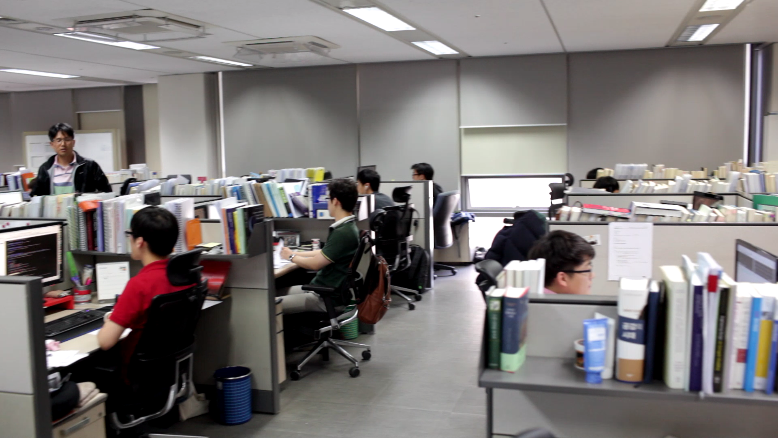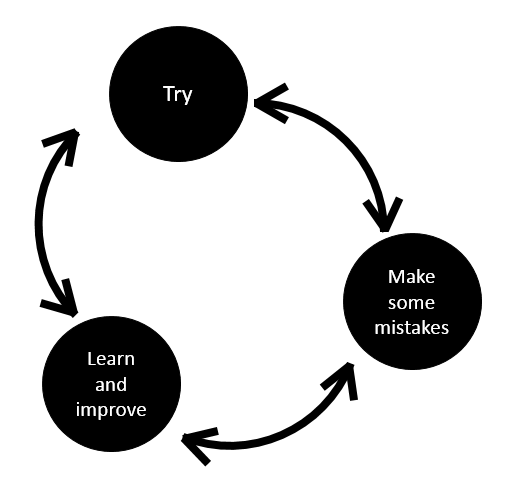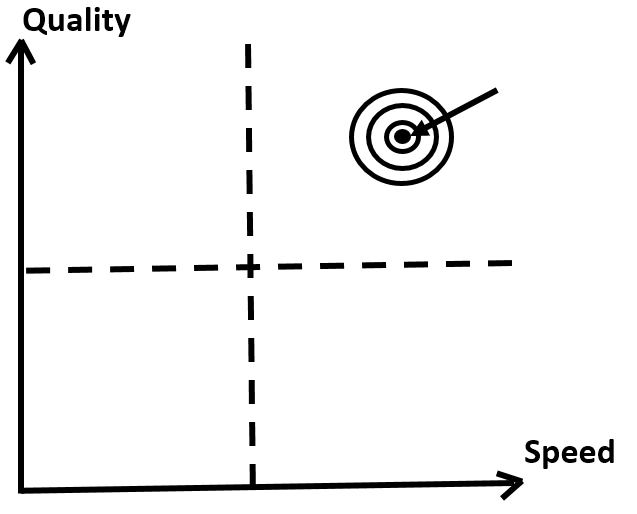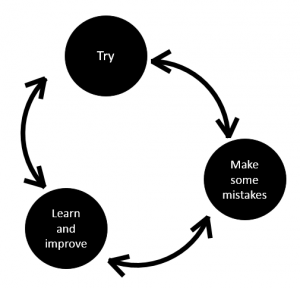Quality VS Speed: I am sure we all have the same problem at least once in our life:
We are divided between doing things fast and roughly or doing things in details but slowly.
What’s the best quality or speed?
Aiming for quality and perfection
Being a European in an Asian culture company gives me a unique view on this problem because I am confronted daily with this problem.
The country where I was born, France, is already a developed country and thus, the general mindset of the people, society, businesses revolves more around doing a quality job, even if it takes a lot of time.
What I learn since I was a kid was that I always had to try to aim for “perfection”.
Doing the best I could to get the best solution available with the resources I had.
Learn to upgrade my skills in order to improve my craft.
What’s the problem about that?
Everyone wants as much quality as they want to get, but the problem is the time it takes to reach Mastery in one skill.
Generally, the process is slow, and many things can happen during the road towards mastering the skills.
The environment is changing, life takes sometimes an unexpected turn and everything you learn may not be useful in today’s competitive world.
But, to be frank, in Europe, we don’t see much change happening.
Everyone is preaching the need to change, but no one really acts towards changing old habits.
Changing is scary after all, especially for the old European dinosaurs.
Asia and the speed of improvement
You cannot imagine how the change is happening fast in China and Korea if you never witnessed it.
I lived for 3.5 years in China and 4 years in Korea and I was shocked many times by the speed of improvement and the meaning that is attached to change and growth in the Asian countries.
In China and Korea, I could observe the changes in the urban landscape with my own eyes.
If I compare the buildings that were around me when I arrive in Korea and now, the change is startling. Buildings are growing like mushrooms here. Korea can build 20 high rise buildings in 2-3 years time in a zone where there were only fields.
That’s something that totally surprised me because of the huge difference of culture.
The speed of business in Korea
What I am observing as well is not only the speed of the construction industry but also the pace of life and business life in Korean society as well.
Korean are constantly in a hurry. The most common expression here is “Balli, Balli” (Fast, Fast).
Everything should be done fast. If it can’t be done fast, then it shouldn’t be done.
People are working up to midnight in the office and they have no personal life.
The “work-life balance” is just a foreign concept here. No one will treat you seriously if you say that you want to keep some time for your personal life. Actually, they will scorn at you and treat as a bad “team player”, because you are not staying late to “finish your work”.
The word efficiency is foreign, only the hours count. Stupid right?
What I understood from that is that Koreans are kind of placing the interest of the company and of the country higher than their own interest. There are of course Koreans who are against that (the younger generations), but they have not much choice as the society here is strongly patriarchal. The most important thing is to listen to older people and thus managers are always right…not discussion is allowed.
Koreans are kind of sacrificing their own freedom to provide a boost to the business and that’s why it is going much faster than anything I saw in Europe.
Developing quickly and failing fast
Koreans have a very special method to do things.
They set first a totally incredible goal that has to be achieved in 6 months maximum and then they strive to work very hard to do everything they can with limited resources, knowledge and technology to obtain a software at the end of the 6 months.
There are a lot of mistakes in their approach, but they don’t care, they just do it.
Generally, the research about the market and the needs of the customers is done in a very superficial manner.
The technology used for the development is archaic and the way they code is frightening.
But as soon as they get something quickly, they try to sell it immediately and they get direct experience from the feedback of the market.
If clients don’t like it, they improve it, change it and correct the bugs.
At the end, they get something sell-able which is even quite good.
That’s what surprised me at first, because with my European vision of things, I had always been blocked by this idea of quality and perfection that I couldn’t understand how something good could come out of so much chaos.
But of course, this approach is far from being perfect also. People always complain, the support side takes really a lot of work and failure is something that sometimes leaves a bitter taste in the mouth.
Perfection doesn’t exist
Let’s be frank with ourselves… perfection is just an idea, a concept in our mind that doesn’t really exist.
What does perfection means anyway? Does it mean that it has no defaults?
Everything has always a bright side and a dark side and because of that, even the best system comes with some defaults.
Not acknowledging that leads only to luring ourselves into complacency.
(Complacency: a feeling of quiet pleasure or security, often while unaware of some potential danger, defect, or the like; self-satisfaction or smug satisfaction with an existing situation, condition, etc)
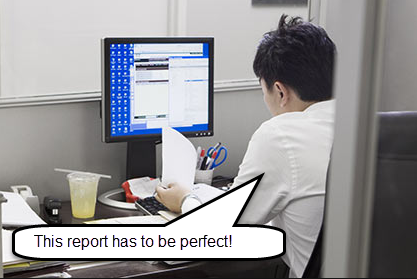
We “want” things to be perfect, because it makes us feel better. That’s the thing.
We are afraid to think that we may fail.
And when we become like that, we stop to learn…
We start to think that everything we know is great and that we “know” everything that should be known.
That’s just self-delusion. And a lot of people have to wake up.
Perfection doesn’t exist, we have to admit it and live with it.
The good thing about that is that there is a space for improvement.
Knowing that we are not perfect motivates us to do something to become better and to improve.
Continuous learning comes from that.
What about quality?
I am not saying that quality isn’t important. It is, of course.
What we have to understand is that quality comes from the repetition of the failure and improvement process.
If we acknowledge we failed, we have to take the lesson from this failure to improve and become better.
After repeating over and over this trial-error process, the quality improves naturally to reach a certain level.
Quality won’t increase only if the improvements stop.
Why would someone stop improving?
The main reason is fear… but why?
We are not afraid to improve… we are afraid of a lot of things which are stopping us from wanting to improve.
For example, if we start to think that what we are doing is not creating real value for the users or if we feel that the improvement will not benefit to anyone, we start to think that we are just wasting our time…
That’s the typical example of the kid in school telling: “Why should I learn maths, all those equations are useless!”
(In fact, this kid just doesn’t know the use, and make an assumption that maths are useless… and because of that stops to learn)
That may happen even if what we do IS valuable….because the problem is that developers often don’t have access directly to the users of the software.
If the communication chain is broken, or if we are not getting feedback about what we did, that’s when we lose confidence in what we are doing.
So…what is better? Quality or speed?
I think there we should do both at the same time.
There is no real choice between the two… everything we do should be a mix of quality work produced quickly.
I know that’s difficult to do, but we should find the best way to optimize both at the same time.
Producing high-quality work quickly means simply that we should be able to think and execute in the best way, even under some pressure of time by focusing on being more efficient.
What should I remember from all this?
1- Don’t be focus on perfection, perfection doesn’t exist.
2- Accept the failure and errors that you will get and focus on improving and changing quickly when you meet failure.
3- Improve your efficiency and your knowledge to perform faster and produce higher quality at the same time.
Why is it important to know all that?
This “Do Fast – Fail -learn – Improve – Do again” process is at the basis of every success.
- Children learn to walk because they fall first and then learn the way to stand.
- We learn a language because we want to tell something, and when the people we are talking to doesn’t understand, we check the dictionary and we change our phrase.
- We become strong in a game (chess, video game,…) because we lose first and then we tell ourselves we have to try harder and become better to win.
- Products we design become better after a failure because we change the design.
Everything is linked!
Do you have some personal example of something you failed at first, then you improved yourself and you succeeded?
Let me know by posting about that in the comments. I want to know.


